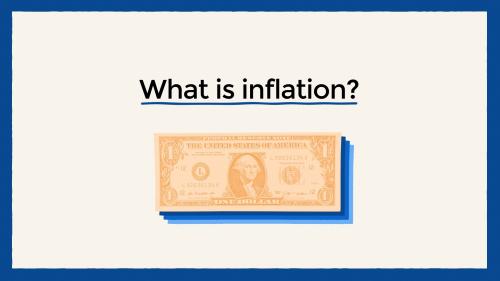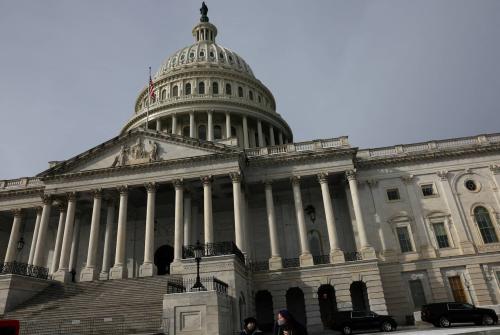In a speech at The George Washington University this afternoon, President Obama addressed the politics behind the federal budget problem and his plan for the future of America’s fiscal policy. Isabel Sawhill, William Galston, Kavita Patel and Ron Haskins provide their take on the president’s speech and plan for dealing with the federal budget problem.
Help Wanted: A Left-of-Obama Voice on the Federal Budget
Isabel Sawhill, Senior Fellow, Economic Studies
President Obama has a habit of arriving at an event a little bit late in the game. Whether on health care reform, Deepwater Horizon, Libya, the Bowles-Simpson plan, or the government shutdown, his style is to hang back, position himself above the fray, and then be the Great Compromiser. Now he has just done it again, finally responding to the Republicans 2012 budget plan with one of his own. But it’s not only a little late; it’s also so middle-of-the road that it risks a compromise that is well to the right-of-center.
As a radical moderate, I don’t mind a middle-of-the-road solution. But even I have a hard time swallowing $4 trillion in deficit reduction over 12 years in which the balance between tax increases and spending cuts is $1 of tax increases for every $3 in spending cuts; in which the growth of Medicare is severely constrained to GDP plus half a percentage point; and in which despite rhetoric about protecting low-income families, they are almost surely going to suffer.
Read the full piece »
President Obama’s Long-Term Fiscal Policy: A Vision of Hope for America’s Future
William Galston, Senior Fellow, Governance Studies
In a forceful speech on long-term fiscal policy, President Obama offered his vision of America’s future, described how our fiscal situation deteriorated to the point that we must change course, and laid out his plan for reducing the deficit by $4 trillion over the next 12 years through a combination of spending cuts and revenue increases. Acknowledging that most Americans do not understand the composition of federal spending, he began the task of public education by outlining how little of the public’s money actually goes to favorite whipping-boys such as foreign aid.
The president sharply criticized the plan Rep. Paul Ryan (R-WI) offered last week on behalf of the House Republican majority. The Republican cuts, he declared, “tell us we can’t afford the America we believe in. And they paint a vision of our future that is deeply pessimistic.” Their vision, he charged, is “less about reducing the deficit than it is about changing the basic social compact.” He contrasted Republicans’ vision for the nation with “the America I know,” which is “generous and compassionate; a land of opportunity and optimism,” a country in which we “take responsibility for ourselves and each other.”
Read the full piece »
The President’s Deficit Reduction Plan: Implications for Health Care
Kavita Patel, Managing Director for Clinical Transformation and Delivery, Engelberg Center for Health Care Reform
President Barack Obama took the very symbolic gesture of delivering his much anticipated speech on fiscal reform and deficit reduction from a podium at George Washington University, an institution of higher learning, including schools of medicine, public health and nursing. By doing so, he signaled the desire to infuse a sense of responsibility in the next generations- those who will ultimately inherit our fiscal woes if we continue on our current path. The auditorium was packed with students who probably have not yet contributed significantly to Medicare or social security much less had any experience with entitlement programs, but the President appealed to their sense of patriotism and national identity by recalling the great ability of Americans to come together around a set of problems, find common ground and once again be the envy of the world’s eye. The message was simple: if we don’t make some tough decisions now we will pay for it dearly in the future. And the future isn’t that far away.
Read the full piece >>
The Budget Hawks are Winning
Ron Haskins, Senior Fellow, Economic Studies
Six months ago, budget hawks were grounded. Like other budget hawks, our hawk cabal at Brookings, often in cooperation with other groups, had been writing books, traveling around the country yelling “FIRE,” meeting with members of Congress and two administrations, organizing public events, writing op-eds – in short, doing all the things those with little power do to get the attention of those in power. And we had been engaged since 2004 with modest impact.
Now, as Senator Moynihan used to say, “of a sudden,” the sky is full of budget hawks. The American public awakened to the problem and ultimately became engaged in the electoral process, in part because of the Tea Party. Over the summer and fall of last year, a platoon of deficit reports also appeared, all of which carefully analyzed the deficit and proposed reasonable solutions. The most important of these was from President Obama’s own commission, co-chaired by a Republican and a Democrat, that recommended cuts in the military, in Medicare and Medicaid, and in other programs, as well as reforms of the tax code that would produce additional revenue while making the code fairer and less complex.



Commentary
Around the Halls: President Obama Addresses the Federal Budget Crisis
April 13, 2011